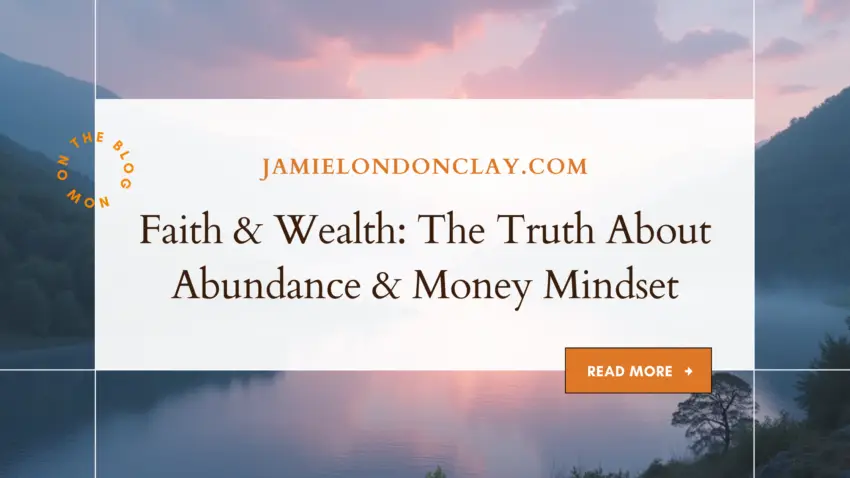Our beliefs profoundly influence our financial well-being in the intricate dance between faith and wealth. Studies reveal that specific religious affiliations correlate with higher income levels; for instance, 44% of Jewish Americans report annual earnings of $100,000 or more, compared to 9% among members of the National Baptist Convention. This disparity suggests that the values and teachings inherent in one’s faith can shape financial behaviors and attitudes toward wealth accumulation.
Beyond religious affiliation, our personal money mindset plays a pivotal role in determining financial success. A positive, abundance-oriented mindset encourages proactive financial behaviors, such as consistent saving, prudent spending, and strategic investing. Equally, a scarcity mindset can lead to fear-driven decisions that hinder wealth building. Recognizing and reshaping these internal beliefs about money is essential for achieving both spiritual fulfillment and financial prosperity.
Recent Insights on Wealth Perceptions and Mindsets
Generation Z thinks it needs $500,000 a year to succeed. What that says about our economy.
Gen Z’s idea of a successful salary is nearly 600% of what Boomers settle for, shocking poll reveals
Being rich today is about much more than money.

Faith & Wealth: The Truth About Abundance & Money Mindset
Embracing both spiritual and financial success can enhance a fulfilling life. On my journey, I realized that a clear money mindset and faith go hand in hand. Together, they can help us create the future we want. Spiritual and financial success can go hand in hand. Creativity heals, and everyone should embrace their gifts with pride. I also believe in breaking generational cycles and rewriting your destiny. This article explores the strong link between faith and wealth. It shows how a positive mindset can create abundance.
Understanding the Faith and Wealth Connection
Early on, I debunked the myth that wealth and faith are in opposition. I started to rethink my view. I saw that a belief in hope and trust can drive financial growth. Abundance isn’t money. It’s also about our spirit, generosity, and contributions to those around us.
Learning how these areas connect strengthened my belief in the value of inner growth and material success.
Balancing faith with thoughtful financial planning leads to more meaningful success. It means shifting from a scarcity mindset. Now, view every financial choice as an opportunity. Trusting in a force greater than myself allowed me to see potential in every challenge. Honoring your beliefs and financial goals leads to a fulfilling and successful life.
This connection is not a magic formula. It requires a clear understanding that wealth extends far beyond physical assets. Generosity, stewardship, and integrity connect with financial success. I learned that success isn’t about getting rich. It’s about using wealth to grow as a person, help the Community, and build a legacy for future generations.
Building an Abundance and Money Mindset
Building a good mindset can transform how you see money and success. I used to worry a lot about money, but then I focused on what I could do instead of what I couldn’t. Switching from fear to optimism changed how I planned my finances. Now, I’m more proactive and less stressed.
A practical way to build this mindset is to focus on positive thoughts and set clear and achievable goals. I see success as small, manageable steps that create a more significant journey. Every financial decision helps me learn and grow, and I stay open to ideas that match my core values.
This transformation does not happen overnight. It takes time and effort. You need dedication, self-reflection, and a desire to swap negativity for positive affirmations. Small, careful steps can lead to significant breakthroughs. This applies to both personal and financial growth over time.
Practical Strategies for Cultivating Wealth
Transforming the idea of abundance into reality involves clear strategies and practical actions. Money management is more than saving or spending. It requires a thoughtful approach and is about building a sustainable system. This system improves security and boosts community well-being.
- Set Clear, Attainable Goals. Define what financial success means to you. I set clear targets that inspire and keep me focused on my goals.
- Create a Balanced Budget: I carefully track my income and expenses. This helps me find innovative ways to save and invest.
- Practice Gratitude. Focusing on what I have makes me feel more abundant, which helps lessen my fear of scarcity.
- Educate Yourself: Financial literacy is critical. I read helpful articles, attend useful webinars, and seek guidance from trusted advisors.
- Give Back to the Community: I set aside some of my earnings for causes I care about. This shows that we should share wealth to help others.
These steps show that managing wealth isn’t about saving money. It’s about building a life that encourages resilience and generosity. Using these strategies makes my financial choices feel natural and rewarding. They also support my growth and security.
Common Considerations in Embracing a Faith-Driven Wealth Approach
Blending faith and financial success has brought me joy, but it also has its worries. Many people worry about failing, especially with big financial choices. A rigid mindset focused on scarcity can cause excessive caution. But when you see challenges as opportunities, that fear starts to fade.
Another challenge lies in balancing deeply held spiritual values with modern financial demands. Modern society often emphasizes material success, which sometimes conflicts with spiritual teachings. My faith shows me I can pursue financial goals with ethics and integrity. This approach values your beliefs and helps you plan wisely. It promotes steady growth in both areas.
Additionally, being aware of outdated generational money habits is essential in this process. I have seen family members struggle due to old ways of thinking about money. Breaking these cycles requires consistent education and a commitment to a new perspective. Questioning old beliefs and using new financial practices can secure your future. This change benefits you and those you influence.
Advanced Approaches for Sustaining Abundance
After you learn the basics, exploring advanced ways to maintain a wealth mindset is easy. I developed a holistic way to achieve abundance. It blends daily personal spirituality with good financial habits. This advanced approach has been essential in ensuring my financial progress remains sustainable.
One method that has served me well is regular self-reflection about my weekly wins and losses. I use journaling and meditation to improve my strategies. This practice keeps me balanced and ensures that my financial methods match my core beliefs and priorities.
Another advanced strategy involves diversifying income sources. Relying on one revenue stream can be risky, so I look for other opportunities. These include investments, passive income projects, and small business ideas.
Networking with like-minded individuals also plays a vital role in sustaining abundance. Joining a community that values spiritual insights, and practical finance helps everyone succeed. You grow as you share your journey with others. Working with peers brings fresh ideas and support, allowing learning and growth progress.
Finally, there is the power of creative thinking. Embracing creative problem-solving refreshes financial strategies and keeps mindsets flexible. Taking smart risks helps us learn, allowing us to adapt quickly to a changing world.
The Basics: What Embracing Faith and Wealth Truly Means
Balancing faith and wealth involve understanding that spiritual health and money are vital for a fulfilling life. Over time, I have understood that each aspect nourishes the other. Spiritual practices offer discipline, clarity, and inner peace, which can help people make smarter financial choices.
Financial planning is a key part of self-care. It helps me reach my life goals—every economic choice matters. I budget with consideration, save with caution, and invest with intelligence. These actions lead to well-being that goes beyond numbers. This balanced approach helps me celebrate money wins, personal achievements, and community efforts.
Changing my old money habits was challenging, but it helped me see a future not based on income. Instead, I focused on meaningful experiences, my dreams, and making ethical contributions. Every choice, big or small, aims to balance spiritual fulfillment with financial stability.
Frequently Asked Questions
Many people have questions when exploring the connection between faith and wealth. Here are some of the questions I often encounter:
Question: How do I begin incorporating faith into my financial planning?
Answer: Start with small, daily practices such as gratitude and quiet reflection. Every financial choice can reflect your valid values. These practices will help you notice the abundance around you as time goes on.
Question: Can spiritual beliefs influence financial success?
Answer: Yes. You make better decisions when you act based on core values and integrity. This alignment improves your money management and opens growth opportunities.
Question: What if I face setbacks in my financial journey?
Answer: Setbacks are a natural part of any adventure. The key is to learn from each experience. See each challenge as a chance to improve your strategies, not a setback. Consistency and patience will eventually lead to long-term benefits.
To break free from generational cycles that block financial success, follow these steps:
- Recognize Patterns: Identify money habits passed down in your family. What beliefs do you hold about money?
- Educate Yourself: Learn about personal finance. Read books or take courses on budgeting, saving, and investing.
- Set Clear Goals: Define what financial success means to you. Create short-term and long-term goals.
- Create a Budget: Track your income and expenses. This helps you see where to save and spend wisely.
- Build an Emergency Fund: Aim to save three to six months’ expenses. This gives you a safety net.
- Invest Wisely: Start small by investing in stocks or retirement accounts. Even insignificant amounts can grow over time.
- Seek Support: Talk to a financial advisor or join a group focused on financial literacy.
- Stay Committed: Change takes time. Keep reviewing your goals and adjust as needed.
By taking these steps, you can have a new path for your financial future.
Begin by educating yourself about financial literacy and questioning outdated beliefs. Welcome latest ideas and practices that match your values. Over time, these changes will lead to a better future for you and those around you.
Wrapping Up
Every day offers a chance to reshape our understanding of what it means to be truly wealthy. Faith and innovative financial planning go hand in hand. Together, they are essential for a fulfilling life. This path needs commitment, a desire to learn, and the bravery to believe in your vision of abundance.
If you’re starting or fine-tuning your method, remember this: success is about gaining financial stability and promoting personal growth. Handle all financial decisions with the same care you give to your personal and spiritual health.
The process of transforming your money mindset happens one step at a time. I keep testing innovative ideas, stay open to change, and learn from each experience. Faith is key in confirming these actions, resulting in a material and spiritual dance.
By combining timeless spiritual insights with modern financial wisdom, you can create a future that reflects your values and goals. Challenges will happen, but each experience matters. They help create a balanced life. Trust in your inner guidance, keep learning and be willing to adjust your approach. This can connect faith with financial success, creating a fulfilling life.
In Essence
Faith and wealth aren’t opposites. Instead, they work together to shape our reality. Adopting an abundant mindset helps us learn about finance. This way, we can break free from our limiting beliefs about money, allowing us to live a life of both spiritual and material prosperity. True wealth isn’t about how much money you have. It means having financial freedom. It’s about finding success with purpose. You can give and create without restrictions.
Suppose you’re ready to break generational cycles and rewrite your financial destiny. Wealthy Affiliate University helps you launch an online business that aligns with your values. This platform guides you step-by-step. Turn your passion into income. Get training, find mentorship, and join a strong community. This way, you create financial security on your terms.
As an affiliate marketer, I earn a commission when you buy through my links. This helps support my mission of empowerment. It is also a strong resource for anyone who seeks financial and spiritual growth.
Visit jamielondonclay.com. There, you can find digital products, art, and resources meant to inspire and support your growth as a whole person. If this message speaks to you, please subscribe to my blog and follow me on social media.
Please share this article with someone who needs it today. Your engagement keeps this Community thriving! Visit my YouTube channel for deeper faith, abundance, and personal growth discussions. I’m beginning this journey, so bear with me as I roll out updated content—but let’s grow together. Are you ready to embrace a wealthy mindset and create the abundant life you deserve? Let’s talk in the comments below!


This article beautifully explores the connection between faith and financial success, showing how a balanced mindset can lead to a truly fulfilling life. I found the point about breaking generational cycles particularly powerful—it’s inspiring to see how redefining money habits can create long-term change for future generations.
I’m curious, what strategies would you recommend for someone just starting to balance spiritual beliefs with modern financial planning? It feels like such a nuanced journey, and hearing your thoughts would add even more depth to this discussion.
Overall, this piece offers thoughtful and practical advice—thank you for sharing such an empowering perspective!
Donna, I’m truly honored by your words—thank you. ???? The connection between faith and financial success is such sacred ground, and I’m grateful it resonated with you, especially the part about breaking generational cycles. That work is profound and transformational—not just for us but everyone who comes after us.
Your question is a good one because, yes, balancing spiritual beliefs with financial planning is a nuanced journey. One strategy I always recommend starting with is this: Treat money as a sacred tool, not a taboo topic. Consider inviting God (or your Higher Power) into your financial planning process. That might look like prayerful budgeting, spirit-led goal setting, or choosing investments that align with your values.
Another key is to practice worthwhile work. Remind yourself daily that wanting more and being grateful for what you have is okay. You can honor your spiritual path while creating overflow. One doesn’t cancel out the other—it enhances it.
I am so glad this message connected with you, Donna. You’re doing the inner work; that ripple will bless many lives. Keep building, keep believing. ????